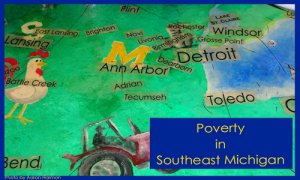Presented By: Institute for Research on Women and Gender
Poverty in Southeast Michigan

Panelists: Sandra Danziger (Social Work, Public Policy), Kristin Seefeldt (Social Work), and Sarah Burgard (Sociology).
While the Great Recession officially ended in June 2009, the recovery that followed has been slow and high unemployment rates and high levels of hardship persist. The Detroit Metropolitan Area was much harder hit by the Great Recession than many other areas of the nation. We present information from the first two waves of the Michigan Recession and Recovery Survey, a stratified random sample of households in Wayne, Oakland and Macomb counties. We highlight findings on employment, income, safety net program participation, material hardships, and health and mental health, particularly among low income households.
While the Great Recession officially ended in June 2009, the recovery that followed has been slow and high unemployment rates and high levels of hardship persist. The Detroit Metropolitan Area was much harder hit by the Great Recession than many other areas of the nation. We present information from the first two waves of the Michigan Recession and Recovery Survey, a stratified random sample of households in Wayne, Oakland and Macomb counties. We highlight findings on employment, income, safety net program participation, material hardships, and health and mental health, particularly among low income households.